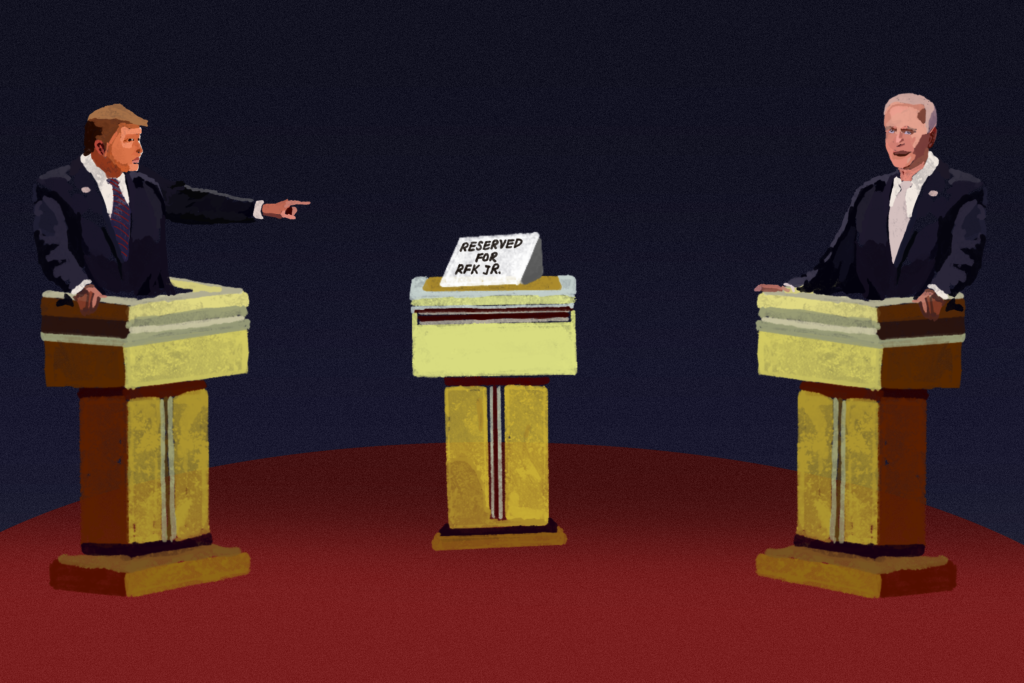With election season heating up again in the United States, President Joe Biden and former President Donald Trump agreed to return to the debate stage, on CNN in June and on ABC in September. In doing so, the candidates rebuked the Commission on Presidential Debates, a nonpartisan organization that had already scheduled three presidential and vice presidential debates according to tradition. In conspiring to circumvent the Commission's decades-old control of the debates, the Trump and Biden campaigns changed the terms of the showdown, most notably by rejecting third-party candidates and eliminating live audiences.
As the most popular third-party candidate in decades, Robert F. Kennedy Jr. deserves to be on the debate stage. Regardless of his chances of winning in November, his identity as an alternative candidate is who Trump and Biden should be facing off against on behalf of the American people. By excluding him, both candidates will give Robert F. Kennedy Jr. an extra boost, whether he qualifies for the debate or not.
If he is elected, the debates will be much more interesting and representative of the feelings of the American electorate. We have already seen the trials and tribulations of Trump and Biden, and a second Trump-Biden showdown is a rematch most Americans do not want. Still, with such a showdown almost inevitable, public interest in the election is at a 20-year low and fears of low voter turnout are high.
As for Biden, one in four Democrats do not intend to vote for him in November's presidential election. The same cannot be said for Donald Trump, who remains the de facto candidate for Republican voters despite a somewhat contested primary. In a three-way presidential race, Trump is expected to narrowly edge out Biden, with RFK Jr. receiving about 8% of the vote. Other polls show RFK Jr.'s approval rating even higher; in two of them, RFK Jr. meets the 15% approval rating threshold required by the Commission on Presidential Debates to include a candidate in the lineup. Given RFK Jr.'s recent polling success, including RFK Jr. in the debates would give Biden and Trump a public forum to challenge a candidate who threatens to undermine their November victory.
RFK Jr. sits at the persuasive ideological intersection of Biden and Trump, which explains his inconclusive assessment of which candidate he is more likely to spoil. If he is allowed to compete, RFK Jr. may be able to re-center the debate on the ideological differences between the various candidates, as opposed to the previous debate between Trump and Biden, which devolved into unproductive bickering. The American public will very likely experience a repeat of the 2020 presidential debate, as both the president and former president made it a priority to make the other candidate look as unattractive as possible. However, if RFK Jr. is allowed to participate, his desire to draw more attention to his policies and the shortcomings of Biden and Trump could motivate the other candidates to focus on policies as well, leading to a much more productive debate.
Apart from Trump and Biden's collusion to exclude RFK Jr. from the debate, the changes to the debate rules are undemocratic and undermine the spirit of the debate. The older candidates' attempts to make the debate as simple as possible by shutting out the audience and muting the microphones when the other candidate is speaking will do little to convince viewers of the candidates' mental and physical health. Proving each other's fitness was a major focus of both camps' campaigns, but especially for Biden, a majority of 2020 voters believe he is too old to be competent as president. RFK Jr., 70, is considered to be in much better health than his opponents, despite the discovery of dead parasites in his brain in 2010. RFK Jr.'s inclusion in the debate would have given viewers a chance to compare the candidates' mental capabilities in a more nuanced light.
Despite the many benefits of RFK Jr. participating in the presidential debates, the uphill battle to gain access to the ballot remains a major hurdle. RFK Jr.’s approval rating hovers around 10% nationally, falling short of the 15% threshold. Moreover, while RFK Jr. has stepped up efforts to qualify for the June debates, he has only managed to secure access to the ballot in a handful of states. While Democrats are making significant efforts to block third-party votes, his campaign has already garnered significant support. Democrats believe that third-party votes will tip the election in favor of Trump. These efforts are not surprising, given that the political system has historically robbed third-party candidates of their power. Most importantly, independent candidates will have to overcome many more hurdles to qualify for the ballot than party-affiliated candidates. Securing access to the ballot in all 50 states as an independent candidate in 2024 is now even harder (and much more expensive) than it was when Ross Perot did it in 1992.
CNN's rules not only impose significant, undemocratic hurdles for RFK Jr. to qualify to participate in the debates (such as requiring RFK Jr., rather than Biden or Trump, to appear on a certain number of ballots by June 27), but also put the integrity of the network at risk. Any move to exclude RFK Jr. would likely violate campaign finance laws. Hijacking democratic values for the sake of a debate that unfairly weakens RFK Jr.'s electoral chances does a disservice to the American people, who deserve debates with fair eligibility standards and productive political discussion.
Maximilian Schenke is an opinion columnist who writes about whatever comes to his mind, but mainly focuses on politics: he loves to hear criticism and whatnot. Email:.

